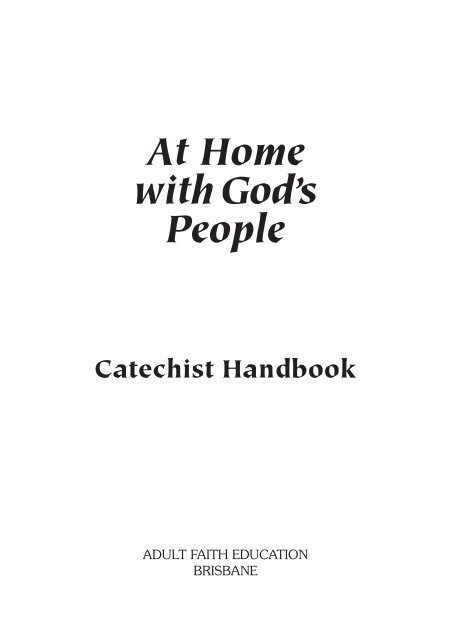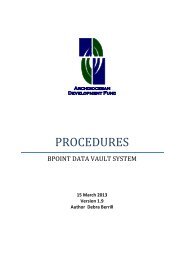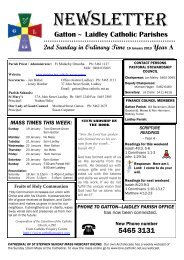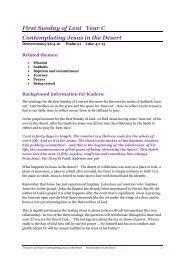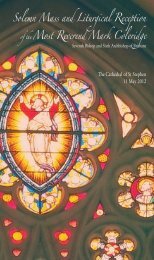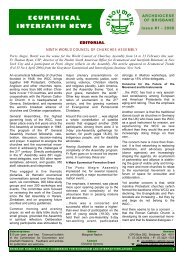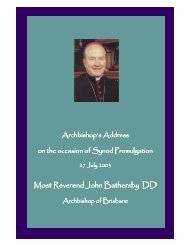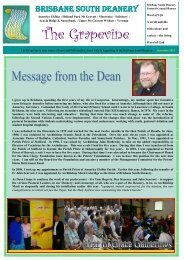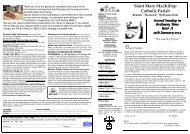Catechist Handbook - Archdiocese of Brisbane
Catechist Handbook - Archdiocese of Brisbane
Catechist Handbook - Archdiocese of Brisbane
- No tags were found...
Create successful ePaper yourself
Turn your PDF publications into a flip-book with our unique Google optimized e-Paper software.
At Homewith God’sPeople<strong>Catechist</strong> <strong>Handbook</strong>Adult Faith Education<strong>Brisbane</strong>1
© Faith & Life<strong>Archdiocese</strong> <strong>of</strong> <strong>Brisbane</strong>Adult Faith EducationRevised edition 2008Written by Fr Bill O’Sheaand Peter GagenThis book is one component <strong>of</strong> the At Home With God’s People resource. Thecompanion book in the series is At Home With God’s People – Participant’s Book.To order copies <strong>of</strong> this resource or for information about other small group andadult faith resources, please write to the address below:Adult Faith EducationGPO Box 282BRISBANE QLD 4001Or by telephone: 07 3336 9163Fax: 07 3336 9177Email: afe.fl@bne.catholic.net.auISBN 0 947282 14 92
ContentsThe catechist and the spiritual journeyThe setting.................................................................................... 5Phases and major rites <strong>of</strong> the RCIA................................................ 6The Catechumenate...................................................................... 8The catechist................................................................................. 9The resource............................................................................... 10Using the resource....................................................................... 10Individual differences................................................................. 14Format for the sessions................................................................ 14Gospel reflection......................................................................... 18Further resourcesBooks..........................................................................................20Videos and DVDs........................................................................213
The <strong>Catechist</strong> andthe Spiritual JourneyThe settingThe resource, At Home withGod’s People, has been preparedwith the understanding that itssessions will be conducted in asmall group.This is because our experience <strong>of</strong>adult faith development has shownthat the small group setting ismost effective where the objectiveis faith sharing, rather than, say,cognitive learning.A ‘small group’ is one <strong>of</strong> 6-10people, and would consist – inthis context – <strong>of</strong> two or threecatechumens and/or candidates,their sponsors and the catechist.It is assumed that the grouphas been formed after prayerfuldiscernment. It is also assumed thatthere are clear links establishedand maintained between the groupand the pastor. In many casesthese tasks – discernment <strong>of</strong> groupmembership and the maintaining<strong>of</strong> links with the pastor – will bedone by a group in the parish– the ‘Team’ – who have theresponsibility for pastoral oversight<strong>of</strong> the catechu menate. Their roleincludes support for the group andthe catechist, sharing information,arranging for books or othermaterials, organising rituals, etc.It assumes, too, that there iscontinuity <strong>of</strong> membership in thegroup, such that trust and cohesioncan develop.In other words, the setting forthis resource is a form <strong>of</strong> basicchristian community.In this setting, the resource aimsto support the group – catechist,catechumens, candidates andsponsors – in the catechumenatephase <strong>of</strong> the Rite <strong>of</strong> ChristianInitiation <strong>of</strong> Adults (R.C.I.A.).The resource is not intendedfor other phases <strong>of</strong> the R.C.I.A.– inquiry, Purification andEnlightment (season <strong>of</strong> Lent) orMystagogy (Easter season). Each <strong>of</strong>these has its own agenda, its ownpurpose and style, its own pastoralresponse.5
Phases and major rites<strong>of</strong> the RCIAThe phases and rites together forma process which unfolds in this way:Phase 1: The Inquiry. This firstphase, as its name suggests, is atime <strong>of</strong> questioning and discovery.It may have been going on formonths or years before any formalcontact is made with the Church.Formal times <strong>of</strong> inquiry in a parish,provide opportunities for inquirersto have their questions addressed,to reflect on how their lives maybe illumined by the Good News <strong>of</strong>the Gospel, and to decide if theirjourney is leading them towardsmembership in the Church.Rite <strong>of</strong> Acceptance into theOrder <strong>of</strong> Catechumens (and/or:Welcome <strong>of</strong> Baptised Candidates).This is the first major rite <strong>of</strong> theRCIA and is celebrated (usually at aSunday Mass) with those inquirerswho may now decide to begin theprocess <strong>of</strong> becoming Catholics. Itis a ritual statement by them thatthey intend their journey <strong>of</strong> faith tobe within this Church community,and it is a ritual statement bythe community that they willwelcome, accompany and supportthese candidates on that journey.Phase 2: The Catechumenate.This phase is described in moredetail shortly. It is where thecatechist’s role begins.Ritual Moment. The Rite <strong>of</strong>Election. As the season <strong>of</strong> Lentapproaches, all those involved(catechist, sponsor, catechumen,etc.) will be asked to reflectprayerfully (discern) on thecatechumen’s readiness to receivethe sacraments <strong>of</strong> initiation –Baptism, Confirmation, Eucharist.This discernment will probably beco-ordinated by the Team.Those who are then found to beready will celebrate this majorrite, which is their statement <strong>of</strong>readiness for the sacraments, andthe Church’s statement – in God’sname – that they are called (elected)to receive these sacraments.Phase 3. Purification andEnlightenment. During the season<strong>of</strong> Lent this is a time <strong>of</strong> prayerfulpreparation for the great events<strong>of</strong> Easter. The emphasis here isless on teaching, and more on thescriptures <strong>of</strong> these Sundays andtheir liturgies. There are Scrutinies,Presentations <strong>of</strong> the Creed and OurFather, as well as the great liturgies<strong>of</strong> Holy Thursday, Good Friday andEaster Saturday (the Triduum).The catechist’s role here isimportant, though in a differentmode, since “this is a period <strong>of</strong>more intense spiritual preparation,consisting more in interiorreflection than in catecheticalinstruction.” (RCIA 126)6
Ritual Moment. Sacraments <strong>of</strong>Initiation. The candidates’ journeyreaches its climax in the greatrituals <strong>of</strong> the Easter Vigil, where, inthe midst <strong>of</strong> the community, theywill be baptised (or received int<strong>of</strong>ull communion if they are alreadybaptised), confirmed, and come tothe table <strong>of</strong> Eucharist.This initiation <strong>of</strong> new membersrenews the Church and all hermembers, as she comes to beMother once more.Phase 4. Mytagogy (Postbaptismalcatechesis). This is aperiod <strong>of</strong> ongoing reflection anddiscovery. Sharing fully now inthe sacraments, the new members<strong>of</strong> the Church reflect on God’sgoodness in their journey, and lookto ways in which they can continueto be part <strong>of</strong> the ongoing life <strong>of</strong> thecommunity. The catechist’s roleis again most important, thoughagain in a different mode.The diagram below represents theRCIA journey.Phase 1InquiryRite <strong>of</strong> AcceptancePhase 2The CatechumenateRite <strong>of</strong> ElectionPhase 3Purification and EnlightenmentRites <strong>of</strong> InitiationPhase 4MytagogY7
The CatechumenateThe <strong>of</strong>ficial text – The Rite <strong>of</strong>Christian Initiation <strong>of</strong> Adults(R.C.I.A.) – describes thiscatechumenate period as a time<strong>of</strong> ‘pastoral formation’, whichincludes four elements:• A “suitable catechesis” …that is “planned to be gradualand complete in its coverage”and “accommodated to theliturgical year”.• Lived experience <strong>of</strong> theChristian way <strong>of</strong> life, by whichthey learn to “turn morereadily to God in prayer, tobear witness to the faith”,and “to practise love <strong>of</strong>neighbour”. These bring about“a progressive change <strong>of</strong>outlook and conduct”.• “Suitable liturgical rites”which purify and strengthen thecandidates, and celebrations <strong>of</strong>the word <strong>of</strong> God, especially theLiturgy <strong>of</strong> the Word at Mass.• “Working actively with othersto spread the Gospel andbuild up the Church”.(RCIA 75)This is represented in the diagrambelow:suitablecatechesislivedexperienceconversionapostolicwitnessritual andlectionary8
At the heart <strong>of</strong> this pastoralformation is conversion, which isboth a turning from (sin, unbelief,emptiness) and a turning to God.The text puts it this way:“The rite … is designed foradults who, after hearing themystery <strong>of</strong> Christ proclaimed,consciously and freely seekthe living God and enter theway <strong>of</strong> faith and conversionas the Holy Spirit opens theirhearts.” (RCIA 1)And again:“The time spent in the catechumenate should be longenough – several years ifnecessary – for the conversionand faith <strong>of</strong> the catechumensto become strong.” (RCIA 76)So conversion is central to thewhole process, and it occurs aspeople become more aware <strong>of</strong>, ormore attentive to:• the reality that God is alwayspresent and active in our lives.• the further reality that God – inthis loving presence and activity– is always calling us, drawingus to something beyondourselves. (Jesus called this“fulness <strong>of</strong> life”.)There are two other aspects:• As we become aware <strong>of</strong> thispresence and this calling <strong>of</strong>God, we respond from thehuman reality <strong>of</strong> where we are,not from where someone elsefeels we ought to be.• Our response – with all its giftsand weaknesses – is influencedand supported by the peopleclose to us in the journey.The catechistThe role <strong>of</strong> the catechist then, is tonurture God’s work <strong>of</strong> conversionin each catechumen and candidate,and to do this by drawing on thefour ‘sources’:• suitable catechesis• lived experience <strong>of</strong> thechristian life• ritual and scripture, and• apostolic witnessEach <strong>of</strong> these is important. Toomit any one is to diminish theeffectiveness <strong>of</strong> the entire pastoralformation.Thus, to simply “work through” theteaching presented in this resource,with no attention to the livedexperience <strong>of</strong> the catechumens andcandidates – their needs, questionsand insights – is inadequate.Similarly, to focus entirely ontheir needs and questions, with noreference to a “suitable catechesis”,or adrift from the lectionary andthe rhythm <strong>of</strong> the liturgical year,is also inadequate; so too, is acatechesis which is divorced fromthe practical work <strong>of</strong> the localChurch as it strives to spread theGospel.9
The role <strong>of</strong> the catechist, then, isto provide the kind <strong>of</strong> environmentfor the group• where individual conversionpaths are nurtured;• where each <strong>of</strong> the ‘sources’ forformation can be addressed;• where connections can bemade between these sources asopportunities arise.The resourceAt Home with God’s People isa resource that aims to help thecatechist carry out this role throughjudicious use <strong>of</strong> this <strong>Handbook</strong> andthe Participant’s Book.The Participant’s Book is anattempt to provide clear teachingfor the “orderly catechesis” that iscalled for.In its 25 topics major truths andimportant themes are addressedfor people reflecting on beingCatholic Christians in our world<strong>of</strong> today. Obviously, this list is farfrom exhaustive; there are manyother topics that could have beenincluded and are not. If any suchomission becomes obvious foran individual or a group, then wehope as the group leader you willfind other material to fill that gapand address their need.It is important to remember thatconversion is only partly aboutinformation – eg the ‘content’ <strong>of</strong>the 25 topics. The Participant’sBook also provides suggestionsand activities to help thecatechumens and candidates keepin touch with key aspects <strong>of</strong> theirjourney <strong>of</strong> faith –• their own lived experience,• their practice <strong>of</strong> prayer,• their deeper acquaintance withthe Scriptures,• the week-to-week richness <strong>of</strong>the Sunday Gospel,• the down-to-earth attempts <strong>of</strong>their local church to help God’skingdom come.Using the resource• Ensure all participants havetheir books before the firstmeeting. If possible point outto them the Preparation forthe meeting page on page 9for the first topic (a sample isprovided on the facing page)and invite them to spend sometime reading and reflecting.Each week the participants areinvited to Personal Reflectionon their own lived experience<strong>of</strong> the topic being considered.They may need some assistanceto find scripture quotes in theirBible. Allay any concerns theymay have about the meetings.Check that they know whereto come and the time (bothbeginning and ending) <strong>of</strong> themeeting.10
in search <strong>of</strong> godPreParation for the MeetingPersonal reflectionPart <strong>of</strong> being human is to be alwayssearching for happiness – for what maybe good or true or beautiful for us.the name we give to that dream <strong>of</strong>ultimate happiness or goodness orbeauty is ‘god’. Your own search for godhas brought you to where you are now,reading these words.as part <strong>of</strong> the searching, spend sometime reflecting on these questions.• can you recall something that wasa real help to you in your search forgod? Perhaps a particular event ... aconversation ... a book ... a person ...a thought that struck you. rememberit. remember what a difference itmade to you.• Part <strong>of</strong> the catholic belief is that godis always present and lovingly activein our lives, whether we’re aware <strong>of</strong> itor not. Do you think god was presentin the times you remembered in theprevious reflection? Where do youthink god is present in your life now?What do you think God is calling youto, right now?God speaks to meYou may use one <strong>of</strong> these readings forseveral days; you may choose a differentone each day.open your heart to the spirit <strong>of</strong> god.read. Listen. Pray.• Psalm 8. a song in praise <strong>of</strong> god thecreator.• Psalm 13. A confident appeal to God.• Psalm 19:1-6. ‘the heavens are tellingthe glory <strong>of</strong> god.’• Psalm 103. god is love andcompassion. and John 1:35-39.‘come and see.’At Mass this weeknotice the variety <strong>of</strong> people gathered forMass in your parish this sunday. each oneis on his or her own journey <strong>of</strong> faith, <strong>of</strong>growing closer to god.ask your sponsor to share some <strong>of</strong> his orher journey with you.Praying• find a place, and make some timewhen you can be still. relax andgently follow your breathing for alittle while. Become still. Let yourthoughts return to one <strong>of</strong> the timeswhen you felt you had ‘found’ godin your life. talk to god in your heartabout that time and what it meant toyou. say ‘thank you, god’ as <strong>of</strong>ten asyou like.• If you find yourself thinking aboutsome <strong>of</strong> the others in your group, youmight imagine yourself placing themin god’s loving hands, and say ‘godbless ...’ You can do this as <strong>of</strong>ten asyou like. Don’t forget to put yourselfthere, too. ‘god bless me’.
Time spent sharing onthese reflections, when thegroup comes together, willbe extremely useful for thecatechist in finding wherepeople are, what theirquestions and needs are inregard to the topic, and thushow the material may be bestapproached.Further, this sharing <strong>of</strong>reflection and subsequentdiscussion on the topic mayindicate that the group ismoving towards another area<strong>of</strong> church teaching, which mayoccur much later in the actuallist <strong>of</strong> contents. Alert catechistswill note this, and suggest thatthe group looks at the topicon marraige for next meeting,instead <strong>of</strong> the topic on Mary,for example.• Each topic has somesuggestions about Praying.These too, if sharedappropriately, can giveindicators to an attentivecatechist about what ishappening in their journey <strong>of</strong>faith, and what directions maybe suggested.• The God Speaks to Me part<strong>of</strong> each topic is a wonderfulopportunity for candidates t<strong>of</strong>ind their way through theirBibles and to come to prayerfulreflection on the passagessuggested. Spending time inthe group on sharing thesereflections on the scriptures canbe most rewarding, and is furtherencouragement to them todevote time to it in preparationfor the group meeting.• Another suggestion for eachsession is that they spend timewith the Gospel <strong>of</strong> the followingSunday, reading it prayerfullyand making connections withtheir own life. This carriesseveral possibilities:- In preparation, the catechistmay note an obvious linkbetween the Sunday Gospel– especially for some <strong>of</strong> themajor feasts – and one <strong>of</strong>the topics for catechesis.This, too, can result in asuggested reordering <strong>of</strong> thesequence. E.g. “next Sundayis Corpus Christi, let’s focuson Eucharist”.- The catechist could help thisreflection on the SundayGospel by giving the groupa reflection sheet with acouple <strong>of</strong> specific questionsto help them. (An exampleis given on pages 18,19.)This would need to beprepared beforehand, (bythe catechist, or by a fewcatechists planning together,or by someone on the parishCatechumenate team).- A reading <strong>of</strong> the previousSunday’s Gospel – or phrases12
from it – could well be thefocal point <strong>of</strong> the openingtime <strong>of</strong> prayer in eachsession.• Encourage participants tohave a journal or notebook.Each week they can writeresponses to the ‘PersonalReflection’ section, ‘God speaksto me’, and ‘Praying’ sections.Encourage them to take notesas they read the topic duringthe week – also to ‘highlight’and mark the text in the book.Any questions or issues thatarise as they read can also bewritten in the journal and thenshared with the group. Oneteaching strategy is to delegatedifferent sections <strong>of</strong> the topicto members <strong>of</strong> the group.Ask them to bring to the nextmeeting a brief summary <strong>of</strong> thesection and to share the mainpoints with the group.These can be <strong>of</strong> greatassistance to the catechist andsponsor in ‘being attentive’, aswell as being <strong>of</strong> value to all themembers <strong>of</strong> the group.• At the end <strong>of</strong> each topic thereis a brief section: Deepeningthe Reflection. This includesa prayer which may be usedto conclude the meeting andreferences to the CatholicCatechism. The numbersrefer to paragraph or sectionnumbers which are indicatedthroughout the text <strong>of</strong> theCatechism.All <strong>of</strong> the above suggests that atsome meetings, the catechesisproposed in the Participant’sBook does not get treated, becausethe group has spent so much <strong>of</strong> itstime:- praying out <strong>of</strong> the Sunday’sGospel;- sharing their reflections on theirexperience <strong>of</strong> the topic for thissession;- sharing on how they found theprayer suggestions;- sharing their reflections on theirreading <strong>of</strong> God’s Word;- simply tabling what ishappening to them in theirjourney;- recording the apostolic witnessthey may have been involved in,during the week.If the central agenda is conversion,then this seems to have beena very pr<strong>of</strong>itable meeting,outweighing the importance<strong>of</strong> treating some part <strong>of</strong> theParticipant’s Book. <strong>Catechist</strong>swill need to be attentive to allthe possibilities, and to be quitecomfortable with meetings like this.So much <strong>of</strong> this role consists inbeing attentive. It is one <strong>of</strong> themost important qualities for acatechist to have, or to develop.13
And since conversion is anexpression <strong>of</strong> God’s gracious loveat work in the individual, anotherkey quality is prayerfulness – abeing aware <strong>of</strong> God’s action in ourlives and the lives <strong>of</strong> others.Individual differencesAnother area that the catechistwill soon be aware <strong>of</strong>, and thenattentive to, is the differences thatexist in the group.Some will be quiet, drawingtheir energy from within. Theseintroverts will possibly enjoy thesuggestions for reflection andprayer, but then may find it difficultto express to the group what ithas meant to them. The catechist,noting their relative silence in thegroup, will find appropriate waysto ensure they are incorporatedinto the sharing: perhaps a quietquestion, then sufficient pauseto allow them to ‘go inside’ andreflect before answering.Some on the other hand, areextroverts, drawing their energyfrom the outer world. These mayfind the reflections and prayerexercises more difficult, andmay need to be reminded andencouraged. Extroverts will <strong>of</strong>tendo their thinking by talking, whichcan result in their dominating thegroup’s sharing time. The alertcatechist will find appropriate waysto address this: perhaps inviting thegroup to spend a minute in quietreflection before responding to aquestion, then inviting one <strong>of</strong> thequieter ones to respond first.It can sometimes happen that,even when a catechist has triedseveral things, one person maycontinue to have a disruptiveinfluence on the group. Thecatechist may need to take counselhere – from another catechist,from someone on the team, fromsomeone who understands people– and decide on a firmer course<strong>of</strong> action. This may involve havinga conversation with the personaway from the meeting, pointingout the disruptive nature <strong>of</strong> theirbehaviour, reminding them <strong>of</strong> thebasic purpose <strong>of</strong> the group – tonurture conversion – and comingto some arrangement. If all elsefails, the person may have tobe asked to leave the group andbe accommodated elsewhere.Fortunately, this is quite rare, giventhe motivation <strong>of</strong> the people whocomprise a catechumenate group.Format for the sessionsLeaders <strong>of</strong> small groups quicklycome to discover that no twomeetings are the same – differentquestions, different needs, differentatmospheres, etc. However,with these variations assumed, ageneral format for these sessions isproposed as follows:14
1. A time <strong>of</strong> gathering,welcoming and inclusion.This could be 5-10 minutesbefore the meeting, and thefirst couple <strong>of</strong> minutes into themeeting. (It is important toestablish the habit in the group<strong>of</strong> beginning and ending ontime).2. Prayer. A time when the groupis asked to become quiet, anddeepen their awareness <strong>of</strong>God’s loving presence andactivity – in each <strong>of</strong> them,and in the group gathered. Itcan also be a time when theyare asked to make sure theyhave ‘arrived’, and are not stillengaged with the issues <strong>of</strong> theday.In this reflective and attentiveclimate, passages or phrasesfrom the previous Sunday’sGospel will <strong>of</strong>ten provide thebread for prayer, either spokenor not. It may also lead to somesharing.The Prayer included at thebeginning <strong>of</strong> each chapter <strong>of</strong>the Participant’s Book canalso be used here – perhaps toconclude the prayer time.While this may take 5-10minutes it may sometimesgo longer, with the catechistsensing when the praying hasfinished and something else– like a discussion – has begun,indicating a move to the nextpart. As trust builds in thegroup invite participants tobe involved in preparing theprayer.3. Sharing <strong>of</strong> Experience. Thegroup is now asked to share thediscoveries, insights, questions,etc., that have emerged fromtheir preparation for themeeting.They have already beenencouraged to spend time onthe Personal Reflection andPraying suggestions in theParticipant’s Book, perhapswriting down ideas or questionsthat arose. It is this preparationthat is now shared, always withthe understanding that theyshare only that which they arecomfortable about divulging.Sometimes this may occupyonly 5 minutes, at other timesit may occupy most <strong>of</strong> the rest<strong>of</strong> the session, the catechistdetermining whether to let itrun, or to move on.4. God’s Word. When the groupbecomes more familiar withthe Bible (and for a start, thecatechist may need to helpthem by showing them whereto find the passages) theirsharing <strong>of</strong> what they have found15
Gospel ReflectionFirst Sunday <strong>of</strong> LentThen Jesus was led by the spirit out into the wildernessto be tempted by the devil. He fasted for forty days andforty nights, after which he was very hungry, and thetempter came and said to him, “If you are the Son <strong>of</strong>God, tell these stones to turn into loaves.”But he replied, “Scripture says:Man does not live on bread alonebut on every word that comes from the mouth <strong>of</strong> God.”The devil then took him to the holy city and made himstand on the parapet <strong>of</strong> the Temple. “If you are the Son<strong>of</strong> God” he said “throw yourself down; for scripture says:He will put you in his angels’ charge,and they will support you on their handsin case you hurt your foot against a stone.”Jesus said to him, “Scripture also says:You must not put the Lord your God to the test.”Next, taking him to a very high mountain, the devilshowed him all the kingdoms <strong>of</strong> the world and theirsplendour. “I will give you all these” he said “if you fallat my feet and worship me.” Then Jesus replied, “Be <strong>of</strong>f,Satan! For scripture says:You must worship the Lord your God,and serve him alone.”Then the devil left him, and angels appearedand looked after him.(Matt. 4:1-11)18
Discussion points• It’s comforting to see Jesus struggling with temptations justas we do. And reassuring to know the same Spirit is withus, when we lean towards taking the easy way out.• What ‘desert’ do you find yourself in at the moment? Howconscious are you <strong>of</strong> the Spirit being with you?• The 40 days <strong>of</strong> Lent have begun. How do you plan to bein solidarity with Jesus? Fasting? Prayer? Alms-giving?Reflective processIn preparing the questions, these ideas <strong>of</strong> Father Ray Kemp(Washington) may help you:1. What did you hear?What thoughts, phrases, and images stood out fromScripture?2. What does it mean?Why did certain thoughts, phrases, and images strikeyou? Were there events in your life that were somewhatsimilar to the events in the Scripture reading? Whatquestions do the Scriptures raise about life, faith, orChurch?3. What will it cost you to live the message <strong>of</strong> today’sScripture?What are you being called to? What are the obstacles toliving the call?19
Further resourcesBooksHere is a short list <strong>of</strong> books which thecatechist may find useful as references,in addition to the Catechism <strong>of</strong> theCatholic Church. Parishes may investin a copy <strong>of</strong> each for catechists toaccess.The Essential Catholic <strong>Handbook</strong>(Liguori Publications Dove, 1997)What Catholics Believe and Why(Cardinal Edward Clancy, CatholicEnquiry Centre, 2002)Your Faith (Redemptorist Publication)Believing in Jesus: A PopularOverview <strong>of</strong> the Catholic Faith(Leonard Foley, St Anthony MessengerPress)Catholic Enquiry Centre coursematerial on the internet:www.catholicenquiry.com/course/course.htmlThe Catechumenate Answer Book(Paul Turner, Resource Publications,San Jose, 2000)Discerning Disciples (Donna Steffen,Liturgy Training Publications Chicago,2004)Resources for Lent and EasterMany dioceses have excellent Lentendiscussion programs. Contact yourdiocesan <strong>of</strong>fice for information.Some options are: TransformingLove – Hope for the World (Year B);Every Day with Jesus (Year C); andGathered for Giving (Year A). Theseresources are available from AdultFaith Education, 07 - 3336 9181.Becoming Easter People –Leader’s Book and Participant’s Book,a resource for the mystagogy period– Easter-time (Adult Faith Education,07 - 3336 9181)Resources for reflecting on theSunday readingsPrayerTime, book available for eachliturgical year – A,B or C (RenewInternational, available from AdultFaith Education, 07 – 3336 9181)Summit (a journal published quarterlyby the Office for Worship Melbourne,www.melbourne.catholic.org.au/<strong>of</strong>w/thesummit.htm)Reflections on the Sunday Readings(Published by the Catholic Institute <strong>of</strong>WA – PO Box 130, Inglewood WA)20
Videos and DVDsThis list has been compiled by <strong>Brisbane</strong>Catholic Education Multimedia Centre.These resources may be borrowedfrom the Centre (07 - 3033-7405).Other local resource centres may havesuitable material.GeneralAdult Baptism: Exploring itsMeaning (31 mins, USA)Becoming Catholic: An Adult’s FaithJourney (33 mins, USA)RCIA Starter Stories (each story isfrom 3-7 minutes in length. Notesprovided. USA)In Search <strong>of</strong> GodFinding God in All Things, LoyolaPress, USA, 2002.The Mystery <strong>of</strong> God series, RCL,USA, 1997.Bigger Than Our Names: Images<strong>of</strong> God for Today, Albert StreetProductions, Fitzroy, Vic, 1996.PrayerPrayer and Spirituality: The CatholicFaith IV, Echoes <strong>of</strong> Faith series,RCL, USA, 1998.Peaceful Journeys: Praying, FisherProductions, USA, 1998.Prayer Made Simple and Joyfulseries, Twenty-Third Publications,USA, 1997.Praying Our Questions: Teach Us toPray, St Anthony Messenger Press,Ohio USA, 2001.What Is Prayer? Fisher Productions,USA, 1996.Prayertime, Familytime, Twenty-Third Publications, USA, 1995.Christian Meditation, Compass series,ABC-TV, Australia, 2002.The BibleIntroduction to the Scriptures: TheCatholic Faith V, Echoes <strong>of</strong> Faithseries, RCL, USA, 1998.Welcome to God’s Library, Twenty-Third Publications, USA, 2000.5 Basic Approaches to Scripture:Part 1, Twenty-Third Publications,USA, 1997.Introduction to the Bible, LiturgicalPress, Collegeville MN USA, 1990.The God <strong>of</strong> RevelationJesus and the Rise <strong>of</strong> Christianity,Discovery Communications Inc, USA,2002.Jesus: The Mystery <strong>of</strong> God, RCL,USA, 1997.ChurchDo We Need the Church? RJIEEnterprises, Western Australia, 2003.This Sacred People, Twenty-ThirdPublications, USA, 2001.The People are the Church, StAnthony Messenger Press, 1997MaryMary <strong>of</strong> Nazareth: From Icon toWoman, Family Theatre Productions,USA, 2000.Virgin Mary, Saint Paul, Moses, BBCWorldwide Ltd, UK, 2004.21
Jesus / Mary, Mother <strong>of</strong> Jesus Movie,Warner Brothers, USA, 1999.Sacraments <strong>of</strong> the ChurchLiturgy and Sacraments: TheCatholic Faith II, Echoes <strong>of</strong> Faithseries, RCL, USA, 1998.Sign, Symbol & Sacrament, TheCelebrating Church series, MadelinePowell, Gold Coast Qld, 2004.The Life <strong>of</strong> FaithHow to Live Our Catholic Faith,Catholic and Capable series, RCL,USA, 1997.It All Begins with Jesus, TheCelebrating Church series, MadelinePowell, Gold Coast Qld, 2004.Moving On: Responding in theSpirit, Franciscan Communications,California, USA, 2001.Finding God in all Things, LoyolaPress, 2002The Sacraments <strong>of</strong> Initiation:Baptism and ConfirmationAdult Baptism: Exploring ItsMeaning, Catholic Update Videoseries, St Anthony Messenger Press,Ohio USA, 1996.Baptism, Mystery <strong>of</strong> Faith series USA,Fisher Productions, 1994.Called by Name, The CelebratingChurch series, Madeline Powell, GoldCoast Qld, 2004.Christ-Bearers; UnderstandingBaptism, Fitzroy Vic: Albert StreetProductions, 2002.Life in the Spirit, The CelebratingChurch series, Madeline Powell, GoldCoast Qld, 2004.Sacrament <strong>of</strong> Baptism: Past andPresent, Twenty-Third Publications,USA, 2002.The Sacrament <strong>of</strong> Confirmation:Past and Present, Twenty-ThirdPublications, USA, 2004.Spirit and Community: SealedWith God’s Spirit, FranciscanCommunications, 2004Come to the Water: The AdultJourney to Baptism, USCCBPublishing, 2005The Sacraments <strong>of</strong> Initiation:EucharistThe Sacrament <strong>of</strong> Eucharist:Past and Present, Twenty-ThirdPublications, USA, 2002.Eucharist, Mystery <strong>of</strong> Faith series,Fisher Productions, USA, 1994.Eucharist – Celebrating ChristPresent, Catholic Update Video series,St Anthony Messenger Press, OhioUSA, 1995.Remember and Recognise– Understanding Catholic Eucharist,Catholic Enquiry Centre, Darlinghurst,NSW, 2005Eucharist: God’s Way <strong>of</strong> EmbracingUs, Rolheiser, Ronald, Oblate Mediaand Communications, 2006The Bible has Mass Appeal,Evangelisation Resources Down Under,<strong>Brisbane</strong>, 2008.The Structure <strong>of</strong> the MassRitual: The Language <strong>of</strong> Worship, StFrancis Special Ministries, USA, 1997.The Mass – The Mystery <strong>of</strong> Faith,Albert Street Productions, Fitzroy Vic,1997.22
Why We Go to Mass – Liturgy andOur Lives, Loyola Press, USA, 2002.Why Catholics Do What they Do inChurch and Connecting with God,Videos with Values, 2002Sin and Forgiveness:Lent: A Time To Forgive, Twenty-Third Publications, USA, 1990.Pardon and Peace ... Remembered,Franciscan Communications,California, USA, 1998.Reconciliation, Mystery <strong>of</strong> Faithseries, Fisher Productions, USA, 1994.The Church Celebrates theReconciling God, Catholic UpdateVideo series, St Anthony MessengerPress, Ohio USA, 1999.The God Who Reconciles, CatholicUpdate Video series, St AnthonyMessenger Press, Ohio USA, 1998.Walks with Jesus 2: Reconciliation,RCL, USA, 1998.MarriageSacraments <strong>of</strong> Service, Oblate Mediaand Communications, USA, 2001.The Sacrament <strong>of</strong> Matrimony:Past, Present, Future, Twenty-ThirdPublications, USA, 2004.PriesthoodPriests 24/7, Albert StreetProductions, Fitzroy Vic, 2003.Sacraments <strong>of</strong> Service, Sacraments:God’s Amazing Grace series, OblateMedia and Communications, USA,2001.The Sacrament <strong>of</strong> Holy Orders:Past and Present, Twenty-ThirdPublications, 2005AnointingWalks with Jesus 3: Anointing <strong>of</strong> theSick, RCL, USA, 1998.Sacraments <strong>of</strong> Healing, Sacraments:God’s Amazing Grace series, OblateMedia and Communications, USA,2001.The Church’s Prayer for the Sick:Sacrament <strong>of</strong> Anointing, St AnthonyMessenger Press, Cincinnati OH,2003 (VHS).The Sacrament <strong>of</strong> Anointing <strong>of</strong> theSick: Past and Present, Twenty-ThirdPublications, 2005 (DVD)Ministry and missionDo We Need the Church? TheEmmaus Series, RJIE Enterprises,Western Australia, 2003.Catholics Listening to God: Vol 3- The Teaching <strong>of</strong> the Church/TheMission <strong>of</strong> the Church, CatholicEvangelisation Services, UK, 2001.The Church Before and After VaticanII, The Vision <strong>of</strong> Vatican II for Todayseries, Fisher Productions, USA.The Sacrament <strong>of</strong> Everyday Life, TheVision <strong>of</strong> Vatican II for Today series,Fisher Productions, USA.When Did I See You Hungry? TheSan Damiano Foundation, California,USA, 2002The moral lawChristian Moral Living: TheChallenge and the Possibility, MakingSense <strong>of</strong> Christian Morality series,Fisher Productions, USA, 1996.23
Catholic Morality: The Catholic FaithIII, Echoes <strong>of</strong> Faith series, RCL, USA,1998.Bioethical Issues: Ethics at the Edge<strong>of</strong> Life, Making Sense <strong>of</strong> ChristianMorality series, Fisher Productions,USA, 1996.Faith First – Liturgy and Morality,RCL, USA, 2001.Law and freedomAuthority and obedienceHuman Dignity, The FaithfulRevolution: Vatican II series, Vatican IIProductions, USA, 1997.The Church Human and Divine, TheVision <strong>of</strong> Vatican II for Today series,Fisher Productions, USA.Social JusticePunished Not Protected, Rymer BaylyWatson, 2004.The Gospel Is a Social Message:Justice in the Christian Tradition,Making Sense <strong>of</strong> Christian Moralityseries, Fisher Productions, USA, 1996.Wealth and Poverty, AppleseedProductions, Vic, 1998.Caritas Australia: One World OneFamily, Caritas Australia, NorthSydney, NSW, 2000.Care <strong>of</strong> the PlanetAppropriate Technology: Caringfor People and the Environment,Community Aid Abroad, Australia,1996.God’s Earth, ABC-TV, Australia,1999.Beyond Death: What Can We HopeFor? John Thornhill and Fr PatrickLim, Thornlie WA, 2004.Kiribati Presentation UN Earth Day2001, NTNK, Kiribati, 2001.The Garden Planet: The Call toEcological Conversion, CatholicEarthcare, Australia, 2002.The Greening <strong>of</strong> God, Compass,ABC-TV, Australia, 2000.The last thingsDeath and Taxes, CatholicCommunications, <strong>Brisbane</strong>, 1995.Trauma And Spirit, Compass, ABC-TV, Australia, 2000.What Is Death? Death A PersonalUnderstanding series, Sleeping GiantProductions, 1998.24


